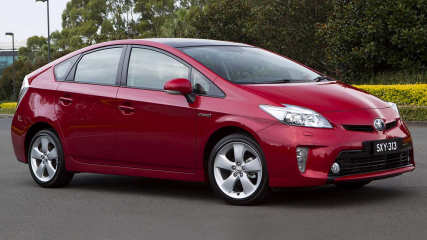1997 Mercedes-Benz SLK230 Reviews
You'll find all our 1997 Mercedes-Benz SLK230 reviews right here. 1997 Mercedes-Benz SLK230 prices range from $12,650 for the SLK-Class SLK230 Kompressor to $16,830 for the SLK-Class SLK230 Kompressor.
Our reviews offer detailed analysis of the SLK-Class's features, design, practicality, fuel consumption, engine and transmission, safety, ownership and what it's like to drive.
The most recent reviews sit up the top of the page, but if you're looking for an older model year or shopping for a used car, scroll down to find Mercedes-Benz SLK-Class dating back as far as 1997.
Or, if you just want to read the latest news about the Mercedes-Benz SLK230, you'll find it all here.
Mercedes-Benz Reviews and News

What are the safest used cars you can buy? From the Toyota RAV4 and Honda CR-V to the Kia Cerato, here are the results from the 2023 Used Car Safety Ratings
Read the article
By Tim Nicholson · 15 Nov 2023
Choosing a used car can be tricky. You want to make sure you're not getting ripped off and that the car has been well looked after and doesn't have any hidden damage. But another key consideration is safety.
.jpg)
2024 Mercedes-Benz GLE and GLS upgrades confirmed: Prices up, designs refreshed and specification lifted for updated BMW X5 and X7 rivals
Read the article
By James Cleary · 14 Nov 2023
Mercedes-Benz Australia has confirmed pricing and specification details for revised 2024 GLE SUV and Coupe models, including high-performance AMG variants, as well as an updated GLS in standard, AMG and ultra-luxury Mercedes-Maybach form.
.jpg)
2024 Mercedes-Benz CLA Coupe models confirmed for November arrival: Cosmetic changes, more standard spec and prices up for Audi A3, BMW 2 Series Gran Coupe rival
Read the article
By James Cleary · 09 Nov 2023
Mercedes-Benz Australia has confirmed pricing and specification for upgraded versions of its CLA compact four-door coupe models, including performance-focused Mercedes-AMG variants.
.png)
Mercedes-Benz EQE 2024 review: Sedan 350 4Matic
Read the article
By Emily Agar · 07 Nov 2023
Mercedes-Benz has released an all-electric 'saloon' which is the equivalent of its iconic E-Class sedan. It has the looks and technology to rival any EV on the market but what about the practicality for a family? Will this be the luxury electric sedan families have been hoping for?

Hybrid and electric cars are much easier on brakes
Read the article
By Stephen Corby · 31 Oct 2023
There is a surprising benefit to driving a hybrid or electric car. It's got nothing to do with fuel economy or the range between charges.Instead, it's a massive saving on the cost of brakes. Yes, you probably knew that EVs save you money in the long run by being cheaper to fuel and service, but one very specific, and little discussed, area of saving is brakes.Because hybrids and battery cars are continually harvesting the energy normally lost as heat when slowing, there is much less stress on the brakes. That means much lighter wear on the brake pads and longer distances between skimming or replacing the rotors.Under deceleration, the car's electric motor enables "regenerative braking" for a vehicle, spinning to generate electric power which is fed to the battery pack.So, how does this technology work? Do hybrid brakes last longer? Is it the same for an electric car? If you’ve got questions, we’ve got answers. Read on to learn more about how ‘regen’ braking works.In a conventional car (one powered by an internal-combustion engine) the braking system uses friction to slow the car. As you press the brake pedal the brake pads clamp down on the rotors (or the brake drum if you’ve got an older or cheaper car) and slow the wheels down, just like they do on a bicycle.However, the story is very different on a car with an electric motor, either a full battery electric vehicle (BEV) or a hybrid model (HEV), as it can use the electric motor to slow the car.In basic terms, regenerative braking uses the resistance from the electric motor whenever you lift off the accelerator pedal to capture kinetic energy and slow the car down.What this feels like, in practice, is that the car is stopping without you even touching the brakes, or, to put it another way, like a far more extreme version of engine braking (drivers of manual cars will know this feeling).Obviously all BEVs and HEVs still have conventional brake rotors, pads and calipers, but because the electric motor is doing the majority of the work slowing the car, there is actually very little use made of the braking hardware.When a conventional car slows down the brakes convert the energy created in the friction process into heat, which is ultimately wasted energy. That’s not the case for electrified cars, with either an electric or hybrid brake system able to make use of that energy.Instead of generating heat, the regen braking produces kinetic energy and directs it to the battery pack, so not only are you slowing the vehicle down you’re also charging the battery. In a BEV that energy is all directed to the battery, while in a hybrid it can be used in a variety of ways, including powering the auxiliary systems like the air conditioning, or it can go directly to the battery for storage.Yes, because you’re not using the conventional mechanical braking hardware - the pads and rotors - nearly as much and instead relying on the electric motors to slow you down, so the brakes do wear a lot slower.However, it’s not as simple as asking ‘how long do brake pads last on a hybrid?’ or ‘how often do I need to change the brake pads on my EV?’ because every car is different.Both BEVs and HEVs can offer different levels of regen braking, allowing you to alter just how quickly the car slows when you lift off the accelerator.Often this is found in the multimedia system menu, but some modern electric cars, such as the Hyundai Ioniq 5 and Kia EV6, have paddles on the steering wheel that allow you to adjust levels quickly on the move.Why is this useful? Well, if you’re on a freeway or motorway you don’t want to slow suddenly whenever you lift off the accelerator, so you can set the regen to its lowest setting and coast like an internal-combustion vehicle.Then, when you find yourself in a stop-start environment, such as a suburban road or traffic jam, you can dial up the regen and harvest more energy for the batteries.Taxi drivers are reporting huge improvements in brake wear as they use 'regen' instead of the brake pedal to slow in stop-start traffic. One Camry hybrid driver says he did 400,000km on a single set of front brake pads, and Prius cabbies regularly record 200,000km-plus.It takes a while to adjust to regen driving, where you lift off the accelerator early before applying the conventional brakes for the last part of a big stop, but the benefits are obvious.
.png)
Mercedes-Benz EQS SUV 2024 review
Read the article
By Andrew Chesterton · 26 Oct 2023
Mercedes' most luxurious family-focused EV SUV is here, in the shape of the EQS450, a high-riding sibling to the EQS sedan, and, if you will, a kind of electric answer to the flagship S-Class.But is this seven-seater worthy of its considerable price tag? We put it to the test to find out.

Mercedes-AMG GT 2024 review: 63S E Performance 4-Door Coupe
Read the article
By Andrew Chesterton · 25 Oct 2023
Think electrification is all about efficiency? Think again, because the Mercedes-AMG GT63S E Performance is all about excitement. Yes, it's a plug-in hybrid, but it's also one that uses its electric motor and battery primarily to better the twin-turbo V8's performance, and the drive experience. So, does it? We put the GT63S E Performance to the racetrack test to find out.
.jpg)
Ten fastest hatchbacks available in Australia
Read the article
By Stephen Ottley · 20 Oct 2023
The hot hatch is in hot demand these days.
.png)
Mercedes-Benz EQE SUV 2024 review
Read the article
By David Morley · 10 Oct 2023
After delivering a 'traditional' sedan version of the EQE it's no surprise Mercedes-Benz has followed up with an EQE SUV, ranging from a relatively calm and composed 300 entry-grade (the main focus of this review) up to a slightly unhinged AMG53 variant. Dave Morley has all the details from the launch drive.

Top 5 must see cars with rotary engines
Read the article
By David Morley · 06 Oct 2023
The rotary engine is an ingenious piece of work. And, like a lot of bold engineering, it has, over the years, polarised the public as well as making and breaking some of those carmakers which took it on.




